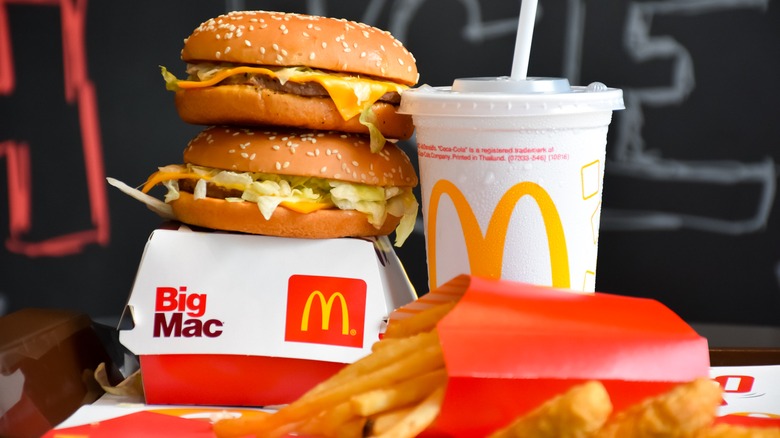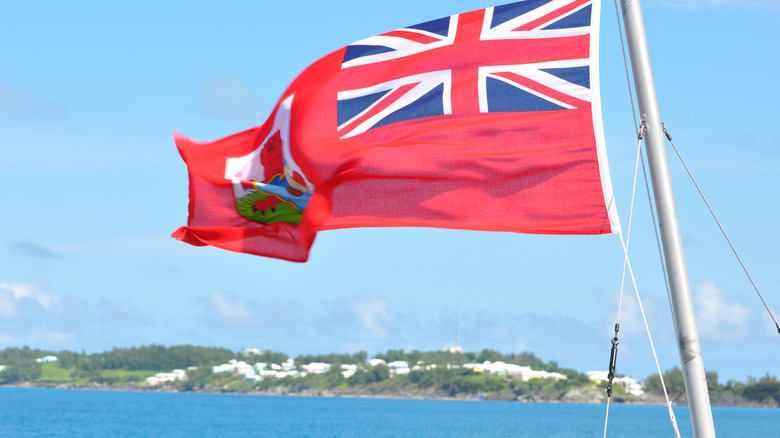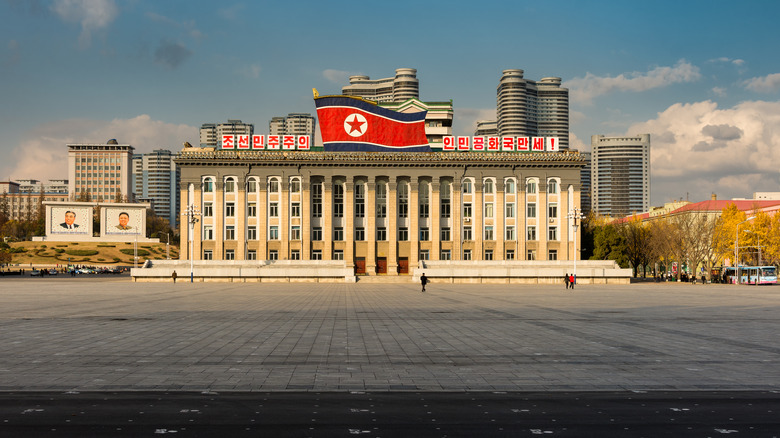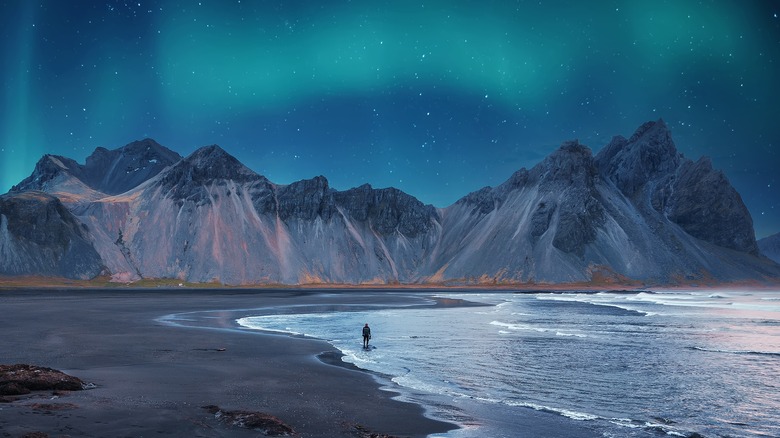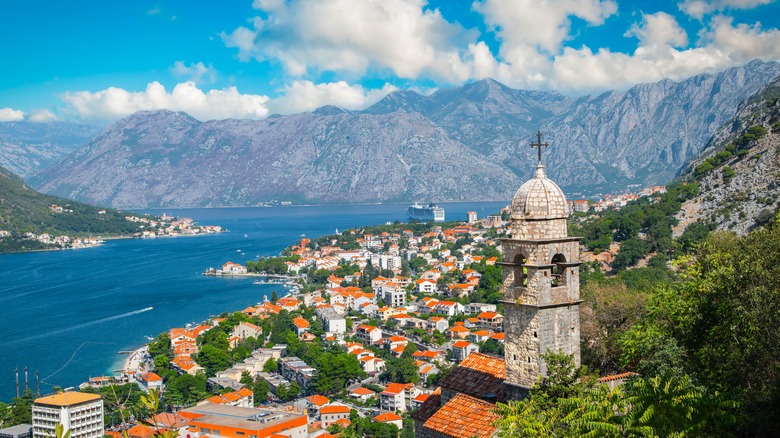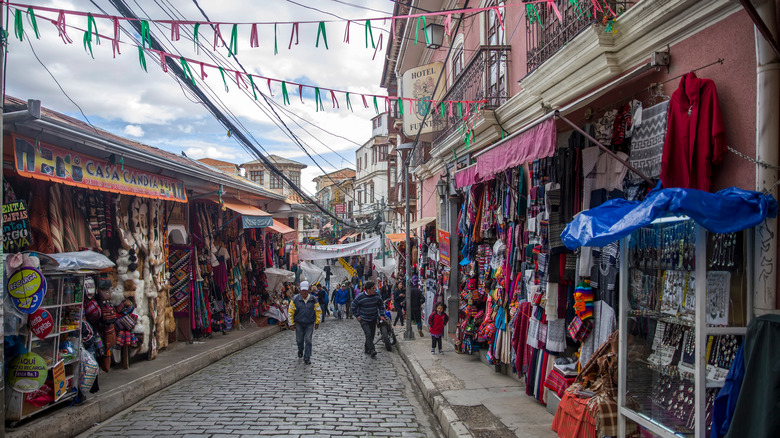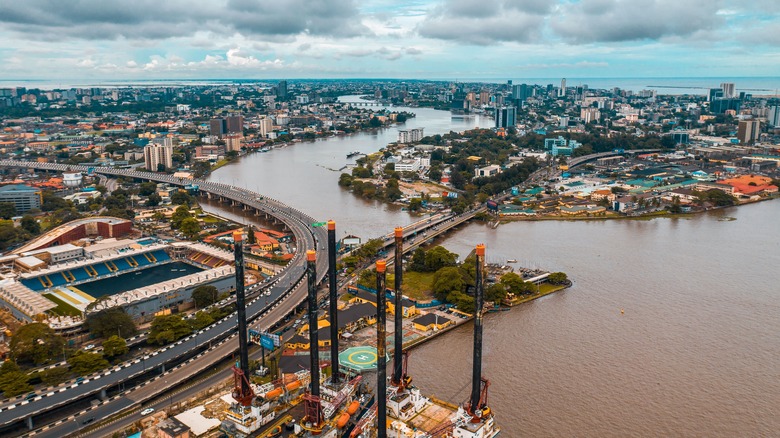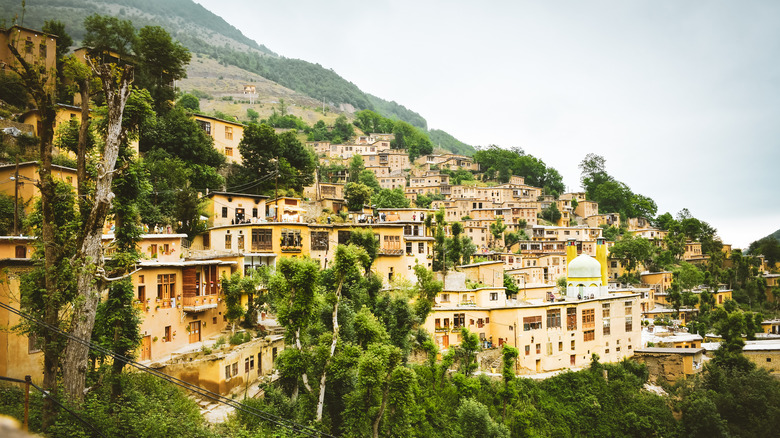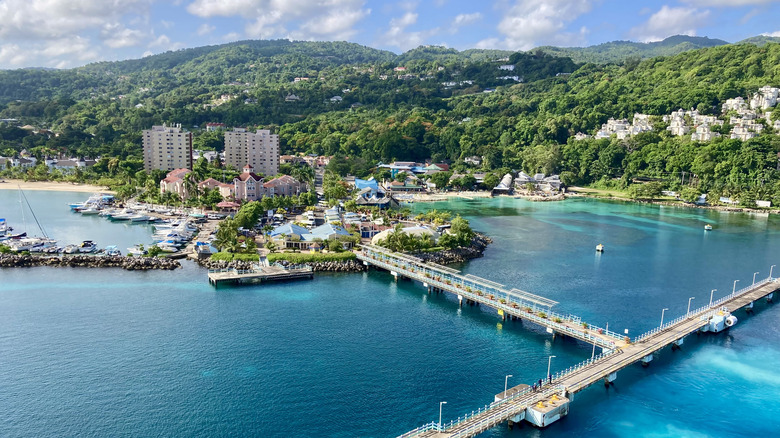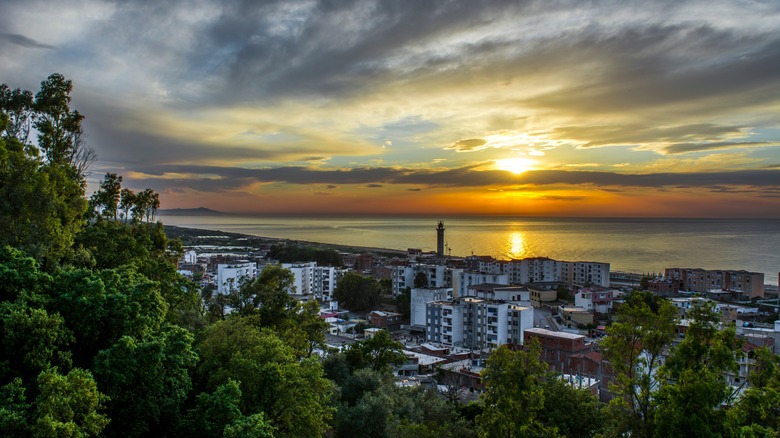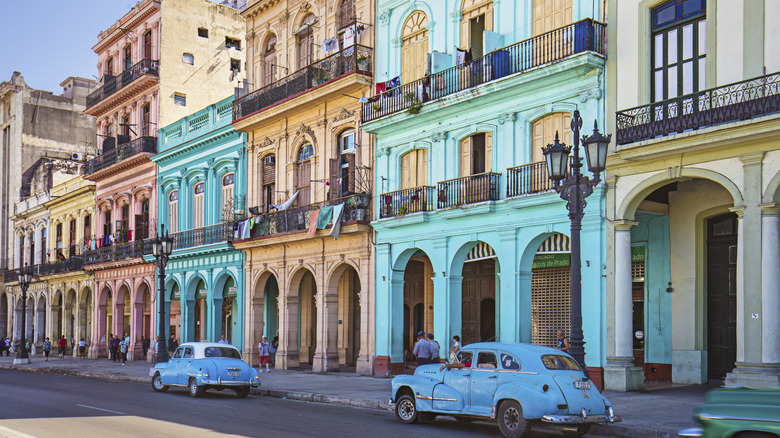10 Countries You'll Likely Never See A McDonald's In
Since opening its first restaurant in Illinois in 1955, McDonald's has become an international phenomenon. It's currently the world's largest restaurant company. Today, you'll find McDonald's restaurants in 118 countries around the globe. Even if you can't get to every one of them yourself, you've probably seen articles and social media posts about the localized offerings in some of these restaurants thanks to McDonald's staying very much its own brand while also adapting to local cultures. For instance, you'll find poutine on McDonald's menus in Canada, and the Teriyaki Chicken Filet-O in McDonald's restaurants in Japan.
But despite the chain's success at fitting in, today, there are over 90 countries where there are no McDonald's restaurants. Reasons range from cultural backlash, local food tastes, laws, economic or political challenges, to practical concerns like supply issues. Here are 10 countries where there are no McDonald's restaurants, and where you're unlikely to ever see one open.
Bermuda
You can enjoy gorgeous beaches, breathtaking caves, and so much more in Bermuda, but one thing you won't be able to do is bite into a McDonald's hamburger. In 1977, Bermuda passed a law banning international restaurant chains, which means you won't find any on the island except for a lone KFC that opened before the law was put into place.
For a while, though, McDonald's had a similar loophole. In 1985, Bermuda's government allowed a McDonald's to open on the St. George's Parish U.S. Naval Air Station. The restaurant was supposed to serve members US military personnel and their families, but it was permitted to open to the general public for a few times a week. It was a huge success. Bermuda 4 U reports that on a general opening day in September 1991, the Bermuda McDonald's was visited by more than 10% of the island's population. Unfortunately, the naval base closed in 1995. Despite its success, the Bermuda McDonald's legally had to close as well. Since then, residents and tourists have gotten their fast food fix at Ice Queen, which Bermuda 4 U considers the closest local option to a McDonald's. Oh, and there is that one KFC, too.
North Korea
Since it was founded in 1948, the Democratic People's Republic of Korea has been a dictatorship, and its government's anti-American sentiments means that the country has never had a McDonald's. Interestingly, though, there was a moment when that could have changed. After meeting then-President Donald Trump in 2018, Kim Jong Un seemed interested in allowing McDonald's, or another American food chain, to open in North Korea as a show of good will, according to The Washington Post. The discussion never moved forward. There are still no McDonald's in North Korea, or any other Western food chain for that matter.
It's a shame, since there's clearly a market for the fast food giant. In 2017, reporters shared photos of staff members of London's North Korean embassy smuggling in food from the Golden Arches. If you go to Pyongyang today, you'll also find North Korea's answer to McDonald's: Samtaesong Hamburger Restaurant. Koryo Tours reports that Samtaesong's burgers may not be the best in the world, and service is much slower than it would be in a typical fast food restaurant, but the chain is pretty popular, especially among young people.
Iceland
Volcanoes, the Northern Lights, and amazing landscapes; there's a lot to see in Iceland. But one thing you won't find is a McDonald's. That wasn't always the case. Business blog Better Marketing reports that at first, the restaurant chain was a celebrated and welcome novelty when it first arrived in 1993. Even then-Prime Minister David Oddsson famously had a meal there. Part of the appeal was that, for many people in Iceland, McDonald's presence symbolized the relatively isolated country's entry onto the global stage. Over time, the fast food chain became a regular part of life.
However, a global calamity eventually drove McDonald's out of Iceland: The 2008 financial crisis. Operating costs rose, and so did prices. The crisis caused the value of Iceland's currency, the krona, to plummet in value, which in turn made the cost of importing crucial food items for the chain skyrocket. Read just about any analysis of why Iceland doesn't have a McDonald's and you'll find this quote from former franchise owner Jon Garder Ogmundsson to Better Marketing: "For a kilo of onion, imported from Germany, I'm paying the equivalent of a bottle of good whiskey."
While there are no McDonald's in Iceland today, you'll find several alternatives including the popular fast food chains Metro and Haborgarabúllan. And if you're craving some weird food history, you can also see the last McDonald's hamburger and fries sold in Iceland on display at Snotra House Bus Hostel in Reykjavik.
Montenegro
The Balkan country of Montenegro is full of fascinating history and beautiful landscapes — and not a single McDonald's. The reason for this is shrouded in mystery. In summer 2003, McDonald's attempted to expand into Montenegro by opening a sort of food truck version of its restaurant in the capital city of Podgorica. The food truck was a success before it was shut down just a few months later. The government of Montenegro's official reason is that it was concerned for its citizens' health. According to The Vienna Review, many experts have interpreted a double meaning in this explanation, believing that the decision was also made in order to limit American influence in the country. The Vienna Review also suggested that at least part of the reason McDonald's was shut down in Montenegro was due to pressure from local competitors, who wanted it gone. When these accusations were published, Montenegro's government issued a press release stating that no company was forbidden to do business there. But McDonald's hasn't returned.
For now, Montenegro's residents will have to get their fast food fix somewhere else. Luckily, the country boasts a number of alternatives including pizzerias, gyro joints, and chains like Goodfellas, which serves American food, including burgers. Speaking of burgers, McDonald's rival, Burger King opened its first restaurant in Montenegro in 2022. Several others have opened since.
Bolivia
McDonald's first opened restaurants in Bolivia in 1997, but the Golden Arches didn't last for long. By 2002, McDonald's had shut down all of its Bolivia restaurants. The two reasons given are that the local population just didn't like the food, and that the local population and government officials thought that McDonald's offerings were too unhealthy. While these issues, in addition to Bolivia's economy, may have been contributing factors, McDonald's failure in Bolivia is far more fascinating. McDonald's is known for adapting to local markets, varying its menu offerings and even the appearance of its restaurants depending on the location. The chain even creates localized varieties of its McDonald's French fries, but its marketing team doesn't seem to have studied Bolivian food culture enough.
Bolivians do like burgers — they just prefer to buy them from indigenous street vendors, who sell them more cheaply and tend to use healthier, locally sourced ingredients. It's hard to say if McDonald's could have beaten this deep-set tradition, but you have to wonder if the chain would have been more successful if it attempted to offer discount menu options and used more natural ingredients for some items. Maybe instead of brick and mortar locations, McDonald's could have invested in mobile restaurants like they did in Montenegro. Whatever the case, you won't find McDonald's in Bolivia today, but you will be able to get a delicious, less costly burger from a street-side food stand or local restaurant.
Nigeria
Only four countries in Africa have McDonald's restaurants, so it's not surprising that Nigeria is on our list. However, the lack of McDonald's restaurants in the country does raise some questions. In a recent CNN article, Stephanie Busari and Nimi Princewill call Nigeria an economic powerhouse, with Lagos, the country's largest city and the epicenter of its tech and pharmaceutical industries, largely contributing to that status. So why hasn't McDonald's come to the seemingly prosperous African country?
Despite Lagos's emergence onto the global economic stage, the country as a whole struggles with infrastructure issues including problems with roads and utilities. Busari and Princewill report that overcrowding is another issue, which limits resources. Africa expert Andrew Christian adds that, like many other African countries, geographical obstacles and a risk of natural disasters have an impact on Nigeria's supply chain. With these factors in play, Christian reports that it's hard to get a reliable source of beef, potatoes, chicken, and bread, which are crucial ingredients for a McDonald's restaurant. Fortunately for residents of Lagos and other Nigerian cities, there are plenty of alternatives to the Golden Arches. Popular fast food chains in Nigeria include Sweet Sensation, which offers a variety of international and locally inspired dishes, and Tantalizers, which has a varied menu ranging from traditional dishes to burgers and snacks. Interestingly, international chains like KFC, Domino's, and Chicken Cottage have a foothold in Nigeria along with McDonald's biggest rival, Burger King.
Iran
There are no McDonald's in Iran, or any other U.S.-owned fast food chains, either. However, that wasn't the case before the 1979 Islamic Revolution, which led to the ruling regime essentially banning McDonald's from Iran as the fast food giant fell out of favor with the populace. The situation almost changed in 1994 when it looked like the fast food giant might return. Unfortunately, the Tehran building where Iran's first McDonald's in 15 years would have opened was burned by anti-American protestors, prompting the company to renounce future plans for opening locations in the country.
Despite the strong show of animosity towards the original, Iran is home to its own version of McDonald's: the very similarly named Mash Donald's. The chain goes so far as to use McDonald's Golden Arches logo. The menu, though, is a bit different. The New York Post reports that typical Mash Donald's offerings include falafel sandwiches and a number of other sandwiches served on baguettes instead of buns. Mash Donald's isn't the only copy of a U.S. restaurant in Iran. Many media outlets and social media posts have gleefully revealed other copycats they've come across, including chicken chain ZFC and the delightfully named Pizza Hat.
Jamaica
In 1995, McDonald's opened its first restaurants in Jamaica, but the chain only lasted for a decade. Several factors contributed to the company leaving this beautiful island behind starting with the local consumers. Although many people in Jamaica enjoyed eating at McDonald's, others took issue with things like the size of the burgers, which they thought were too small for the price, and the chain not allowing alcohol to be sold. At the same time, franchisees were struggling with supply costs. Many McDonald's ingredients had to be imported, leading to high operating costs and causing controversy with local farmers. Add to this the corporate culture of McDonald's, which went against typical practices in Jamaica by requiring franchise owners to follow rules like not owning any other businesses and undergoing long periods of unpaid corporate training. Add in large-scale issues like a slow economy and increasing competition from other international chains, and ultimately, McDonald's decided to shut down its restaurants in Jamaica in 2005.
If you're looking for American fast food in Jamaica today, not to worry. There are Burger King and Wendy's restaurants on the island. But if you want to try a local take on fast food, be sure to check out a chain that sells Jamaican beef patties, a popular treat. (Juici Patties is a good place to start.) Island Grill is also another local chain that specializes in traditional Jamaican dishes you have to try.
Algeria
Visit Algeria and you'll see amazing historical sites like the vast Sahara desert, and maybe even an adorable fennec fox, the country's national animal. But one thing you won't find there is a McDonald's. There are two main reasons for that. One is the complicated laws that Algeria has regarding international companies, particularly the 51/49 law, which prohibits non-Algerians from owning more than 49% of a business in the country. The International Trade Administration reports that despite a few amendments to the law, it's difficult for American companies like McDonald's to do business in Algeria because of the bureaucracy and complicated money transfer procedures. The second reason for the franchise's absence in Algeria is anti-American sentiment. According to a 2019 study, 60% of Algerian students boycott U.S.-related products. That does not bode well for McDonald's.
Algerian consumers' dislike of American products doesn't mean they ignore them entirely. Today, Algeria is full of copycat versions of American chains like Starbucks and, of course, McDonald's. Many of these copycat restaurants use similar logos to the original McDonald's, and have names like McAmin's or McCool.
Cuba
With a U.S. trade embargo in place since 1962, Cuba seems like one of the countries where there would be no McDonald's restaurants. But Cuba is actually the one exception on our list. It's true that there are no McDonald's in Cuba — except on the U.S. military base at Guantanamo Bay. Open in 1986, this official McDonald's branch, which looks just like your average McDonald's restaurant, albeit surrounded by barbed wire, has been cooking up and serving burgers and other McDonald's menu items ever since.
Since the country technically has a McDonald's, you may be wondering why Cuba is often included on lists of countries without the Golden Arches. That's because only U.S. military personnel and official visitors can visit the McDonald's at Guantanamo Bay. Locals and tourists aren't allowed on the base. Luckily, there are plenty of local fast food places in Cuba selling burgers and other typical fare along with many delicious Cuban specialties you need to try.
